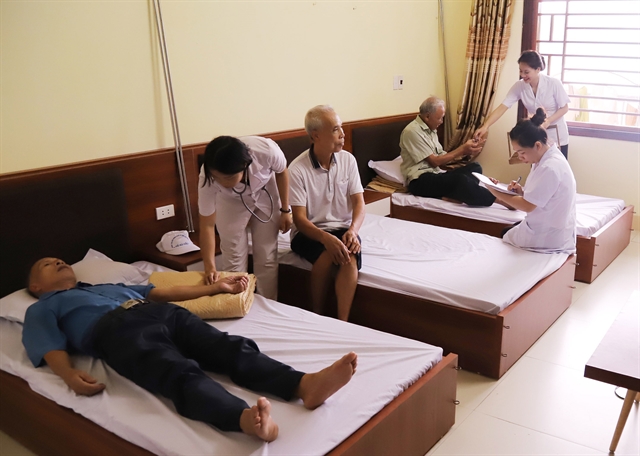 Society
Society


|
| A nursing home for meritorious revolution activists in Thái Ngyên Province receives 2,000 wounded or ill war veterans every year for treatment. — VNA/VNS Photo Hoàng Nguyên |
HÀ NỘI — Vietnamese lawmakers agreed with the Government’s proposal to raise benefit amounts for people who have rendered meritorious services to the revolution and expand the scope of those eligible.
The majority of the delegates present at a meeting on Thursday – held by the National Assembly (NA) Committee on Social Affairs to review the amendments made to the Ordinance on Preferential Treatment of People with Meritorious Services to the Revolution – agreed that the benefits and allowances for those with recognised contributions to the revolution should also be raised to reflect the robust growth the country’s economy has witnessed in recent times.
Under the ordinance, the State is expected to provide several “preferential treatment” regimes for those eligible – monthly subsidies, monthly allowances or lump-sum subsidies – in addition to other support policies such as free healthcare check-ups, financial support for their housing needs or dedicated caretaking centres.
Presenting a report on the amended bill on behalf of the Government, deputy labour minister Lê Tấn Dũng said the draft amendments to the ordinance – slated to be reviewed by the National Assembly Standing Committee in its December sitting – was meant to institutionalise the Party’s orientations on taking care of revolutionary activists and their relatives, aiming to raise 100 per cent of their living standards to a level equal or higher than the average standards in their locality.
The bill was also meant to encourage the revolutionary activists and their families to overcome difficulties, have productive economic activities and contribute more to the upholding of revolutionary traditions in their locality, Dũng said.
Reviewing the bill, Nguyễn Hoàng Mai, Vice Chairman of the NA Social Affairs Committee, appreciated the efforts the Government had put into the bill, but there were still issues of unclear impact assessments and lack of detailed figures and analyses on policy changes that need to be updated in subsequent reports sent to the parliament.
Mai also noted several items that attract differing opinions from delegates that need further studies by the Government.
One of the most controversial proposals from the bill is adding preferential treatment regimes for “third-generation descendants of revolutionary activists who have been exposed to chemical toxins,” which the labour ministry said was the suggestion of many local groups and Agent Orange victims’ associations submitted during various collections of feedback for the draft bill.
Mai said that many members within the committee were concerned over the scientific basis in identifying the list of diseases or deformities associated with toxins – for example, the highly harmful Agent Orange/Dioxin that the US army sprayed over southern Việt Nam during the 60-70s.
With a lack of solid proof, NA deputies worry that the good-will policy will stand the risks of being abused by unscrupulous parties, Mai said, adding that the Government must conduct further research into this issue as per the in-effect bill, the highest level of support only extends to the second-generation descendants of those affected.
As a compromise, Nguyễn Thế Lực, Secretary General of the Việt Nam Association for Victims of Agent Orange/Dioxin (VAVA), offered that instead of blanket support for all grandchildren of those determined to have been affected by exposure to wartime toxins, full support regimes must be given to offspring who suffered from deformities or ailments that are confirmed to be the consequences of the toxins.
Labour minister Đào Ngọc Dung said that the ministry’s own view is that support for third-generation descendants should be prescribed in social welfare programmes, not in the bill for preferential treatment of meritorious revolution activists, but the bill still included the option for the NA Standing Committee to deliberate whether to keep.
NA Social Affairs Committee members also agreed that the Government should be providing ‘funeral fee support’ for the remarried widows of deceased revolutionaries, on top of the monthly allowances that they are already entitled to under the current ordinance.
Other issues including support for war veterans who develop mental health issues after they retire or are discharged from service, whether to axe support regimes for relatives of meritorious revolution activists who have committed crimes and received jail sentences, and should heroic acts be considered under the scope of the bill were also debated at the session. — VNS




